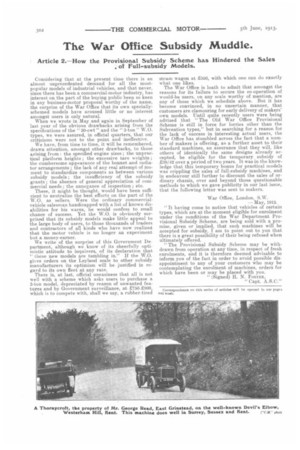The War Office Subsidy Muddle.
Page 4

If you've noticed an error in this article please click here to report it so we can fix it.
Article 2.—How the Provisional Subsidy Scheme has Hindered the Sales of Full-subsidy Models.
Considering that at the present time there is an almost unprecedented demand for all the mostpopular models of industrial vehicles, and that never, since there has been a commercial-motor industry, has interest on the part of the buying public been so keen in any business-motor proposal worthy of the name, the surprise of the War Office that its own speciallyschemed models have aroused little or no interest amongst users is only natural.
When we wrote in May and again in September of last year of the obvious drawbacks arising from the specifications of the " 30-cwt " and the " 3-ton " W.O. types, we were assured, in official quarters, that our criticisms were not to the point and ineffective.
We have, from time to time, it will be remembered, drawn attention, amongst other drawbacks, to those arising from : the specified engine sizes ; the unpractical platform heights ; the excessive tare weights ; the cumbersome appearance of the bonnet and radiator arrangements • the lack of any real attempt of moment to standardize components as between various subsidy models ; the insufficiency of the subsidy grants ; the absence of general appreciation of commercial needs ; the annoyance of inspection ; etc.
These, it might be thought, would have been sufficient to neutralize the best efforts on the part of the W.O. as sellers. Were the ordinary commercialvehicle salesman handicapped with a list of known disabilities for his wares, he would confess to small chance of success. Yet the W.O. is obviously surprised that its subsidy models make little appeal to the large body of users, to those thousands of traders and contractors of all kinds who have now realized that the motor vehicle is no longer an experiment but a money-earner.
We write of the surprise of this Government Department, although we know of its cheerfully optimistic attitude to inquirers, of its declaration that "these new models me tumbling in." If the W.O. gives orders on the Leyland scale to other subsidy manufacturers its optimism will be justified in regard to its own fleet at any rate.
There is, at last, official uneasiness that all is not well with a scheme which asks users to purchase a 3-ton model, depreciated by reason of unwanted features and by Government surveillance, at £750-&800, which is to compete with, shall we say, a rubber-tired steam wagon at R550, with which one can do exactly what one likes.
The War Office is loath to admit that amongst the reasons for its failure to secure the co-operation of would-be users, on any scale worthy of mention, are any of those which we schedule above. But it has become convinced, in no uncertain manner, that customers are clamouring for early delivery of makers' own models. Until quite recently users were being advised that "The Old War Office Provisional Scheme is still in force for lorries other than the Subvention types," but in searching for a reason for the lack of success in interesting actual users, the War Office has stumbled across the fact that a num• ber of makers is offering, as a further asset to their standard machines, an assurance that they will, like others of identically the same designs already accepted, be eligible for the temporary subsidy of £38142 over a period of two years. It was in the knowledge that this temporary bonus for practical models was crippling the sales of full-subsidy machines, and in endeavour still further to discount the sales of ordinary chassis, over and beyond those questionable methods to which we gave publicity in our last issue, that the following letter was sent to makers.
War Office, London, S.W. — May, 1913. " It having come to notice that vehicles of certain types, which are at the moment eligible for enrolment under the conditions of the War Department Provisional Subsidy Scheme, are being sold with a promise, given or implied, that such machines will be accepted for subsidy. I am to point out to you that there is a great possibility of their being refused when ultimately offered. "The Provisional Subsidy Scheme may be withdrawn from operation at any time, in respect of fresh enrolments, and it is therefore deemed advisable to inform you of the fact in order to avoid possible disappointment to any of your customers who may be contemplating the enrolment of machines, orders for which have been or may be placed with you. "(Signed) H. N. FOSTER,
" Capt. A.S.C."
Correspondence on this series of articles will he opened in our pages ext week.


























